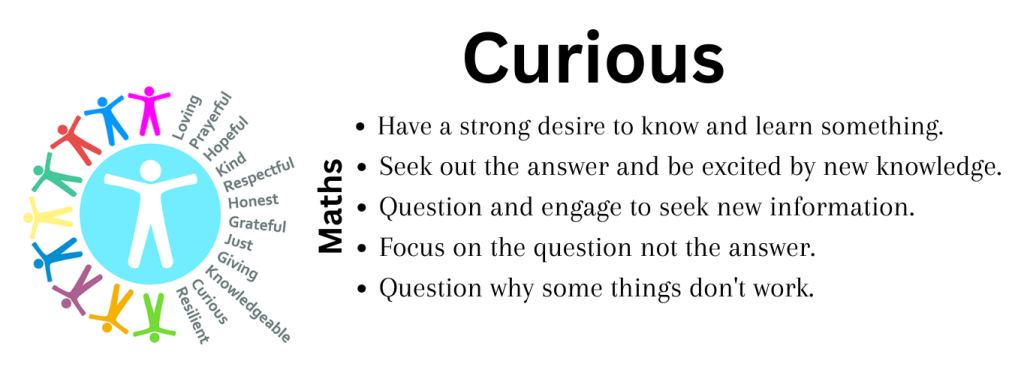Curriculum – Maths
Vision
Maths is core subject and is taught to all students at KS3 and KS4 at our college. The college environment ensures that every student can achieve their personal best and has the support they need to do this.
Mathematics must be accessible to all and we teach stimulating and challenging lessons to all age range and abilities.
Students are encouraged to work hard, become independent thinkers and feel secure and confident with their knowledge of the subject. The curriculum has been designed to develop declarative, procedural and conditional knowledge over time.
Students are monitored carefully with targeted support or intervention implemented in order to help all order to help all students to be successful learners.
Department Virtue
Our department virtue to be curious.
Maths is all about solving problems and we encourage students to be curious about what they are learning and have a desire to ask, investigate and find out new information. We encourgage students to ask questions and develop the skills to undertsand why some methods are better than others.

Key Stage 3
Curriculum Overview
In Key Stage 3 all students will have 3 hours of Maths each week. They will learn about number, algebra, space and measures, ratio and proportion, and handling data. Recall of key facts and problem solving are embedded in the curriculum.
Year 7 students are placed in groups according to their Key Stage 2 data. In Year 8 there are 8 groups, 4 of these will follow an extended curriculum and 4 will follow the core curriculum.
In Year 9 a similar approach is used with the introduction of a support group for those students who may require extra support with their Maths.
Groups are flexible and students may move groups at key points in the academic year if they demonstrate that they are making better or less than expected progress. Homework is an integral part of the learning process, teaching independence and self reliance, and an accessible task is set every week to help develop declarative and procedual knowledge. Students are continuosly tracked and progress is measured each half term.
| Year | Autumn 1 | Autumn 2 | Spring 1 | Spring 2 | Summer 1 | Summer 2 |
|---|---|---|---|---|---|---|
| 7 | Sequences, Algebraic Thinking, Types of Number | Fractional Thinking, Rounding, Approximation & Calculators, Forming & Solving Equations | Written Calculations.Fractions, Decimals & Percentages. Ratio & Proportion. | Perimeter, Area & volume. Applying algebraic thinking. Presenting & interpreting data. | Graphs. Transformations. | Angles & algebra. Analyzing data. Probability. |
| 8 | Laws of Indices, Probability & Tree Diagrams, Properties of Shapes | Fractional Thinking, Algebriac Thinking, Sketching Graphs | Angles in polygons, Constructions, Types of Number | Forming & Solving Equations,Perimeter, Area & Volume, Mid KS3 Assesments | Place Value | Statistical disgrams, Averages for grouped data, |
| 9 | Negative Numbers, Linear Graphs, Sequences | Working with powers & roots, Fractions, Expanding brackets, Equations | Inequalities, Probability, Area & volume including prisms | Percentges, Angles, Transformations, | Pythagoras/ Trigonometry, Standard form | Accurate drawings, Equations, End KS3 exams |
Key Stage 3 Assessment
At the start of Year 7, all students complete a baseline assessment to ensure they are placed in the most appropriate teaching group. Throughout the year, students take half-termly formal assessments to help teachers identify areas for development and provide timely intervention. Weekly recall tests and reviews of 10 key areas of prior learning support long-term retention and understanding.
In Year 8, students sit a mid-Key Stage 3 assessment and continue with regular half-termly assessments. Progress is closely monitored, and students may move between the core and extended curriculum based on their performance. Weekly recall activities continue to reinforce prior learning.
In Year 9, students complete a formal end-of-Key Stage 3 assessment, alongside ongoing short assessments. Weekly tasks include prior learning checks and unstructured problem-solving practice. These assessments help ensure students are placed in the most suitable GCSE group for Year 10.
Key Stage 4 Mathematics (GCSE)

In Year 10, students are grouped into three ability bands: Higher, Intermediate, and Foundation. Students in the Higher and Intermediate bands follow the Higher Tier GCSE pathway, aiming for grades 4–9.
In Year 11, students are placed into either a Higher or Foundation group, depending on the tier of the GCSE examination they are preparing for.
Throughout Key Stage 4, students continue to develop their problem-solving skills and engage in regular GCSE-style question practice. Targeted intervention is provided for students who need additional support to reach their full potential.
GCSE Mathematics Assessment
- All students receive 4 hours of mathematics instruction per week.
- Students follow the OCR (9–1) GCSE Mathematics specification.
- The final assessment consists of three exam papers:
- Foundation Tier: Papers 1, 2, and 3
- Higher Tier: Papers 4, 5, and 6
- Each student will sit one non-calculator paper and two calculator papers, regardless of tier
Please click the title to direct you to the website page.
Gifted and Talented Students
Transferable Skills
Mathematics is a subject that is well respected by employers. There are skills that we teach the students during their time at the college that will be transferable to different areas of life :
These include:
- Problem solving skills
- Written Commincation
- Team work
- Listening skills
- Numeracy skills
- Research & evaluation skills
- Verbal Communication
- Organisation and time management

